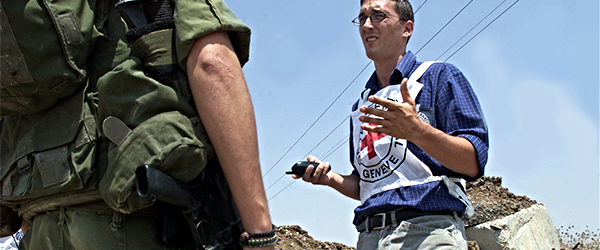The year 2015 was marked by a major anniversary for the International Red Cross and Red Crescent Movement: 50 years ago, its seven Fundamental Principles have been adopted in Vienna. This prompted several initiatives to study their contemporary practice and impact of the principles guiding humanitarian action, including an international conference cycle and this dedicated edition of the International Review of the Red Cross.
Download the full edition (.pdf)
What are the main challenges that humanitarian actors face in upholding a principled approach in today’s crises and emergencies? How are “principles guiding humanitarian action” understood by different actors and used in contemporary field realities? These are the questions to which the Review sought a response in this issue.
The contributions highlight three important dimensions of the principles guiding humanitarian action: (1) they function simultaneously as “tools to do the job” – providing a compass to navigate through difficult choices in situations of conflicts and violence (2) as “identity catalysts” – resulting from the experience of humanitarian workers, principles in turn contribute to shaping the humanitarian sector’s identity and boundaries , and (3) as an “ethos in action” – they are not only principles of humanitarian actors, they are humanitarian principles; the call to uphold human dignity, embedded in the principle of humanity, can and should be heeded by all of us.
Table of contents
Editorial: The humanitarian ethos in action
Vincent Bernard, Editor-in-Chief of the International Review of the Red Cross
The new editorial board of the International Review of the Red Cross
IRRC Editors
Interview with Mr Ma Qiang
Ma Qiang, Former Executive Vice-President of the Shanghai branch of the Chinese Red Cross
Humanitarian principles put to the test: Challenges to humanitarian action during decolonization
Andrew Thompson, Professor of Modern History at the University of Exeter
Romancing principles and human rights: Are humanitarian principles salvageable?
Stuart Gordon and Antonio Donini
Unpacking the principle of humanity: Tensions and implications
Larissa Fast, Science and Technology Policy Fellow with the American Association for the Advancement of Science
Volunteers and responsibility for risk-taking: Changing interpretations of the Charter of Médecins Sans Frontières
Dr Caroline Abu Sa’Da and Xavier Crombé
A matter of principle(s): The legal effect of impartiality and neutrality on States as humanitarian actors
Kubo Mačák, Lecturer in Law at the University of Exeter
Applying the humanitarian principles: Reflecting on the experience of the International Committee of the Red Cross
Jérémie Labbé and Pascal Daudin
Walking the walk: Evidence of Principles in Action from Red Cross and Red Crescent National Societies
Amelia B. Kyazze, Senior Humanitarian Policy Adviser at the British Red Cross
Legislating against humanitarian principles: A case study on the humanitarian implications of Australian counterterrorism legislation
Phoebe Wynn-Pope, Yvette Zegenhagen and Fauve Kurnadi
From Fundamental Principles to individual action: Making the Principles come alive to promote a culture of non-violence and peace
Katrien Beeckman, Head of the Principles and Values Department at the International Federation of Red Cross and Red Crescent Societies
Coming clean on neutrality and independence: The need to assess the application of humanitarian principles
Ed Schenkenberg van Mierop, Executive Director of HERE-Geneva
Tools to do the job: The ICRC’s legal status, privileges and immunities
Els Debuf, Legal Adviser in the Office of the Head of the Legal Division of the International Committee of the Red Cross
Faith inspiration in a secular world: An Islamic perspective on humanitarian principles
Lucy V. Salek, Senior Policy Adviser on Conflict Transformation for Islamic Relief Worldwide
“Rahmatan lil-’alamin” (A mercy to all creation): Islamic voices in the debate on humanitarian principles
Abdulfatah Said Mohamed and Ronald Ofteringer
Faith and impartiality in humanitarian response: Lessons from Lebanese evangelical churches providing food aid
Kathryn Kraft, Lecturer in International Development at the University of East London
Opinion note: Is neutral humanitarian action permissible under Islamic law?
Mohd Hisham Mohd Kamal, Associate Professor at International Islamic University Malaysia
Memorandum: The ICRC’s privilege of non-disclosure of confidential information
ICRC
Speech: Humanitarian diplomacy and principled humanitarian action
Peter Maurer, President of the ICRC
What’s new in law and case law around the world?
ICRC’s Advisory Service on International Humanitarian Law
Book review: Humanitarian ethics: A guide to the morality of aid in war and disaster
Fiona Terry
Book review – International law and armed conflict: Fundamental principles and contemporary challenges in the law of war
Anne Quintin
New publications in humanitarian action and the law (Spring/Summer 2015)
ICRC Library and Research Services
RECENT issues:





Comments